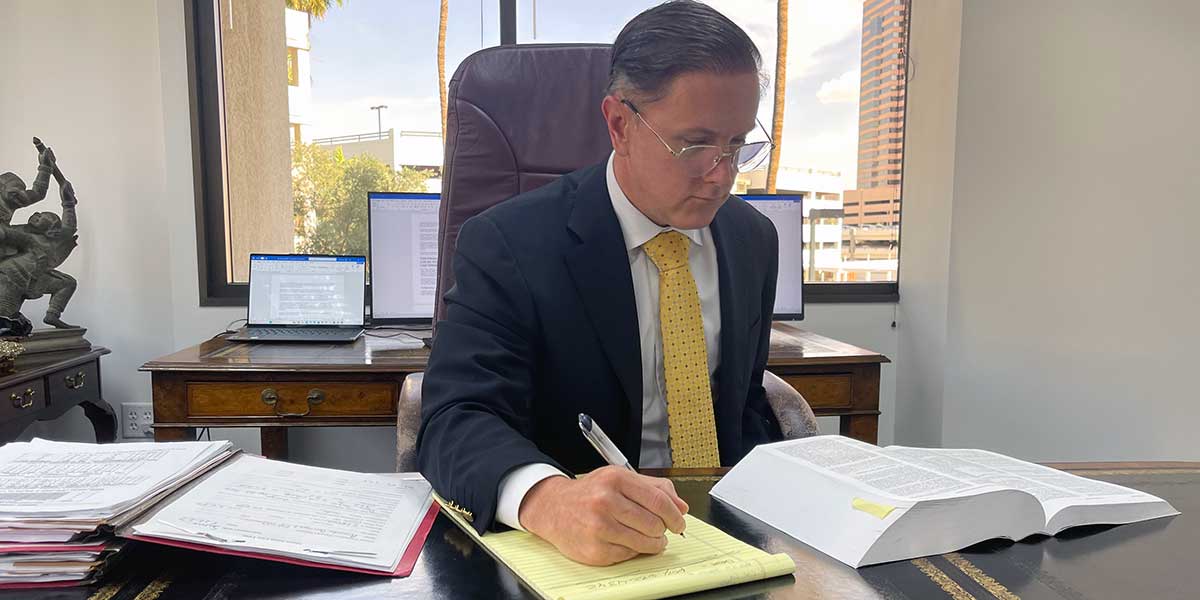If you or a loved one has been accused of child endangerment or child abuse in Arizona, you're undoubtedly facing a difficult period of life filled with uncertainty. Charges like these are serious and can carry long-lasting repercussions that could significantly alter your life. But, rest assured, we will do everything possible to defend you against these allegations. This guide is meant to educate you on the laws in Arizona, potential penalties if charged and also winning defenses.
ⓘ This article will cover the following topics:
According to the U.S. Department of Health & Human Services, approximately 28% of children who were subjects of an investigation for abuse or neglect in 2019 were not maltreated. This suggests that a significant number of individuals may face accusations that are later proven to be false.
Understanding the intricacies of Arizona's statutes, specifically concerning ARS §13-3623 and §13-1201, is crucial. At Kolsrud Law Offices, we specialize in providing expert criminal defense for cases involving these severe charges. This guide aims to break down the complexities of child endangerment and child abuse laws, penalties, and possible defenses in Arizona.
Contact us today to schedule a free consultation and learn more about how we can help you.

Child Endangerment and Child Abuse Laws in Arizona
Two key statutes stand out when discussing child endangerment and child abuse in Arizona: Arizona Revised Statutes (ARS) §13-3623 and §13-1201. Let's break down the critical elements of these statutes:
▶ ARS § 13-3623: Child Abuse
This Arizona Revised Statute 13-3623 explicitly deals with child abuse, outlining that any person who intentionally or recklessly inflicts physical injury, abuse, or endangerment upon a child can face criminal charges. It defines various types of abuse, including physical, emotional, and neglectful acts, as well as the different degrees of punishment, which can range from a Class 1 misdemeanor to a Class 2 felony.
▶ ARS § 13-1201: Adult & Child Endangerment
Arizona Revised Statute 13-1201 is broader and can apply to situations involving adults as well, but it’s frequently cited in child endangerment cases. It criminalizes any act that recklessly endangers another person with a substantial risk of imminent death or physical injury. Depending on the risk involved, the offense could be classified as a Class 1 misdemeanor or a Class 6 felony.
▶ Overlap and Differences
While both statutes can be applied in child endangerment and abuse cases, it's important to understand their distinct elements and applicability. ARS § 13-3623 is more specific to child abuse, whereas ARS § 13-1201 encompasses a wider array of endangerment situations, not just those involving minors.

What Constitutes Child Endangerment?
Child endangerment is a term often misunderstood or misinterpreted. Child endangerment is outlined in ARS § 13-1201, which focuses on exposing individuals, including minors, to substantial risk of physical injury or death. Below are essential points that clarify what actions or behaviors can fall under child endangerment:
▶ Reckless Behavior
The statute for Arizona law defines endangerment as recklessly endangering another person with a substantial risk of imminent death or physical injury. Recklessness is generally considered as knowingly acting (or failing to act) in a manner that creates a risk.
▶ Physical and Emotional Harm
While physical harm is often the first thing that comes to mind, emotional and psychological well-being are also important factors. The statute, however, primarily focuses on physical injury or risk of death.
▶ Circumstances and Context
Whether an action constitutes endangerment can depend heavily on the circumstances. Leaving a child in a car unattended may be considered endangerment, as can failure to supervise a young child near a swimming pool adequately.
▶ Degree of Risk
ARS § 13-1201 classifies endangerment as a Class 1 misdemeanor when the risk involved is not substantial or imminent death. When the risk is substantial and involves imminent death, it is a Class 6 felony.
▶ Relation to Other Charges
It's important to note that endangerment can be charged alongside other offenses, such as a DUI, kidnapping, child sex trafficking, or child abuse, when the actions in question put a child in a dangerous situation.

Penalties for Child Abuse and Sentencing Guidelines
Child endangerment and child abuse are offenses that Arizona courts take very seriously. The legal consequences can be severe and life-altering, often entailing imprisonment, fines, and long-term repercussions. The penalties are primarily outlined in Arizona Revised Statutes (ARS) §13-3623 and 13-1201.
Below are the key points you should know about criminal penalties and sentencing guidelines:
▶ Classification of Offenses
Offenses under ARS § 13-3623 can range from a Class 1 misdemeanor to a Class 2 felony, depending on the severity and nature of the abuse. ARS § 13-1201 categorizes endangerment as either a Class 1 misdemeanor or a Class 6 felony, depending on the risk involved.
▶ Sentencing Range
The penalties vary significantly based on the classification. For example, a Class 1 misdemeanor could result in up to six months in jail, while a Class 2 felony could lead to a prison term of up to 12.5 years or more, depending on the circumstances and prior convictions.
▶ Fines and Financial Penalties
In addition to imprisonment, offenders may be subjected to considerable fines. For a Class 1 misdemeanor, the fine can be up to $2,500, while felony charges can result in much higher financial penalties.
▶ Probation and Parole
Depending on the case, probation or parole may be an option. However, certain conditions must be met, and violating these terms can lead to imprisonment or more severe penalties.
▶ Additional Penalties
Apart from the primary criminal penalties, individuals may be mandated to attend educational or counseling programs. Moreover, child endangerment or abuse convictions often have collateral consequences, including loss of child custody and restrictions on future employment.
| Offense Classification | Minimum Sentence | Maximum Sentence | Fines |
|---|---|---|---|
| Class 1 Misdemeanor (Endangerment) | 6 Months | 6 Months | Up to $2,500 |
| Class 6 Felony (Endangerment) | 18 Months | 3 Years | Up to $150,000 |
| Class 4 Felony (Child Abuse) | 2.5 Years | 8 Years | Up to $150,000 |
| Class 3 Felony (Child Abuse) | 3.5 Years | 16 Years | Up to $150,000 |
| Class 2 Felony (Child Abuse) | 4 Years | 35 Years | Up to $150,000 |

The Role of the Department of Child Safety (DCS)
In Arizona, the Department of Child Safety (DCS) plays a vital role in cases involving child endangerment and child abuse. While the criminal justice system focuses on the legal consequences for the accused, DCS is primarily concerned with the well-being and safety of the child involved. Here are some critical aspects of the DCS's involvement in such cases:
Initial Investigation
Upon receiving a report of suspected child abuse or endangerment, DCS typically conducts an initial investigation. This process often involves home visits, interviews with the child, family members, and other relevant individuals, as well as a review of any supporting documentation or evidence.
Coordination with Law Enforcement
DCS often works in tandem with law enforcement agencies. While their aims are different—DCS focuses on child welfare and law enforcement on criminal prosecution—the two entities share information and collaborate during investigations.
Temporary Custody and Placement
In cases where immediate danger to the child is suspected, DCS has the authority to take temporary custody of the child. They may place the child in a safe environment, which could be with a relative or in a foster home, while the investigation and legal proceedings are ongoing.
Case Plans and Services
If DCS concludes that the child is at risk but removal is not necessary, they may develop a case plan. This plan often includes mandatory services like parenting classes or counseling, aimed at rectifying the issues that led to the endangerment or abuse.
Court Involvement
DCS may file a dependency petition in juvenile court to take legal custody of the child, if deemed necessary. This is separate from any criminal charges that may be filed and focuses solely on the child’s welfare.
According to data from the Arizona Department of Child Safety, in the fiscal year 2020, approximately 36,000 reports regarding child abuse or neglect were screened out and did not result in an investigation.
This indicates that not all reports to the Department of Child Safety lead to an official inquiry or legal consequences. It underscores the importance of expert legal defense when facing child endangerment or child abuse allegations, as not all accusations culminate in substantiated claims.
Potential Defenses in Child Endangerment and Child Abuse Cases
Facing charges of child endangerment or abuse can be a profoundly stressful and life-altering experience. However, it's important to remember that charges do not equate to a conviction. There are numerous defense strategies that can be employed to challenge the prosecution's case.
Below are key points on potential defenses under Arizona law, specifically referencing ARS §13-3623 and 13-1201:
▶ Lack of Intent
One of the main elements the prosecution must prove is intent or recklessness. If it can be demonstrated that the accused did not intend to harm or endanger the child, this could be a viable defense. This is particularly relevant in cases under ARS § 13-3623, which distinguishes between intentional and reckless acts.
▶ False Accusations
Unfortunately, false accusations of child endangerment or abuse do occur. These can arise from contentious family or custody disputes. Proving that the allegations are false can result in the charges being dropped or acquitted at trial.
▶ Insufficient Evidence
The burden of proof lies with the prosecution. If they fail to provide sufficient evidence to substantiate the charges, a skilled defense attorney can motion for dismissal or work to secure a not-guilty verdict.
▶ Reasonable Discipline
Arizona law allows for parents to use reasonable discipline. However, the line between what is considered reasonable and what is deemed abusive can sometimes be blurred. A defense might argue that the actions taken were a form of permissible discipline and not abuse or endangerment.
▶ Affirmative Defenses
Both statutes provide room for affirmative defenses, such as duress or necessity. For instance, if endangerment occurred as a result of trying to protect the child from immediate harm, this could be used as a defense.
According to a study published in the Arizona Law Review, approximately 45% of child abuse cases result in plea agreements rather than going to trial. This suggests that defense strategies can often lead to reduced charges or alternative resolutions.

How a Criminal Defense Attorney Can Help
When grappling with the penalties and legal ramifications of child endangerment or child abuse charges, the choice of legal representation becomes pivotal. The penalties can range from months to years in prison, not to mention the stigma that can permanently affect your personal and professional life. At Kolsrud Law Offices, we bring the following to the table:
▶ Experience That Matters
Lead by attorney Josh Kolsrud, a former federal prosecutor, our team has extensive, hands-on experience defending clients against various criminal charges, including those as severe as child endangerment and child abuse. We leverage this wealth of experience to create effective, customized defense strategies that align with each case's unique characteristics.
▶ Client-Centric Approach
At the core of our practice is a client-centric approach that prioritizes open communication, individualized attention, and a commitment to safeguarding your rights. We strive to keep our clients well-informed at every stage of the legal process, enabling them to make decisions that are in their best interest.
▶ Comprehensive Free Consultations
- In-Depth Case Evaluation: Our law firm offers free consultations: We meticulously assess every detail of your case during our no-cost consultations. This ensures that every potential angle for your defense is considered.
- Strategic Planning: Potential defense strategies are explored during the consultation, and a clear roadmap for the case is laid out.
▶ Knowledge of Arizona and Federal Law
Our team possesses in-depth knowledge of both Arizona state and Federal laws, making us particularly well-suited for navigating the complexities of ARS § 13-3623 and 13-1201, among other statutes.
By choosing Kolsrud Law Offices, you're putting your faith in a dedicated team that prioritizes excellence, offering expert legal counsel, steadfast commitment, and invaluable insights to ensure your defense is as strong as possible.
Contact us today to schedule
A FREE CONSULTANT and learn more
about how we can help you.
An award-winning criminal defense attorney Since 2006
Why Choose Josh Kolsrud
With over 100 jury trials to his name, and years of experience as a state and federal prosecutor, Josh understands the law, the legal process, and your rights. Josh is also committed to representing every client with utmost integrity and dedication
Experience
Josh has prosecuted major crimes on the state and federal level, led a successful anti-human sex trafficking operation that saved lives, and argued before countless juries and justices for his clients
Expertise
Josh is an expert in both Arizona and federal criminal law, and is ready to put that expertise to work for you.
Dedication
As a prosecutor, Josh saw far too many defendants lose their livelihood due to poor representation. Josh will always give every client his complete attention and effort
Get a Free Initial Consultation:
Please complete our form below to get a free initial consultation
or call us at (480) 999-9444.
